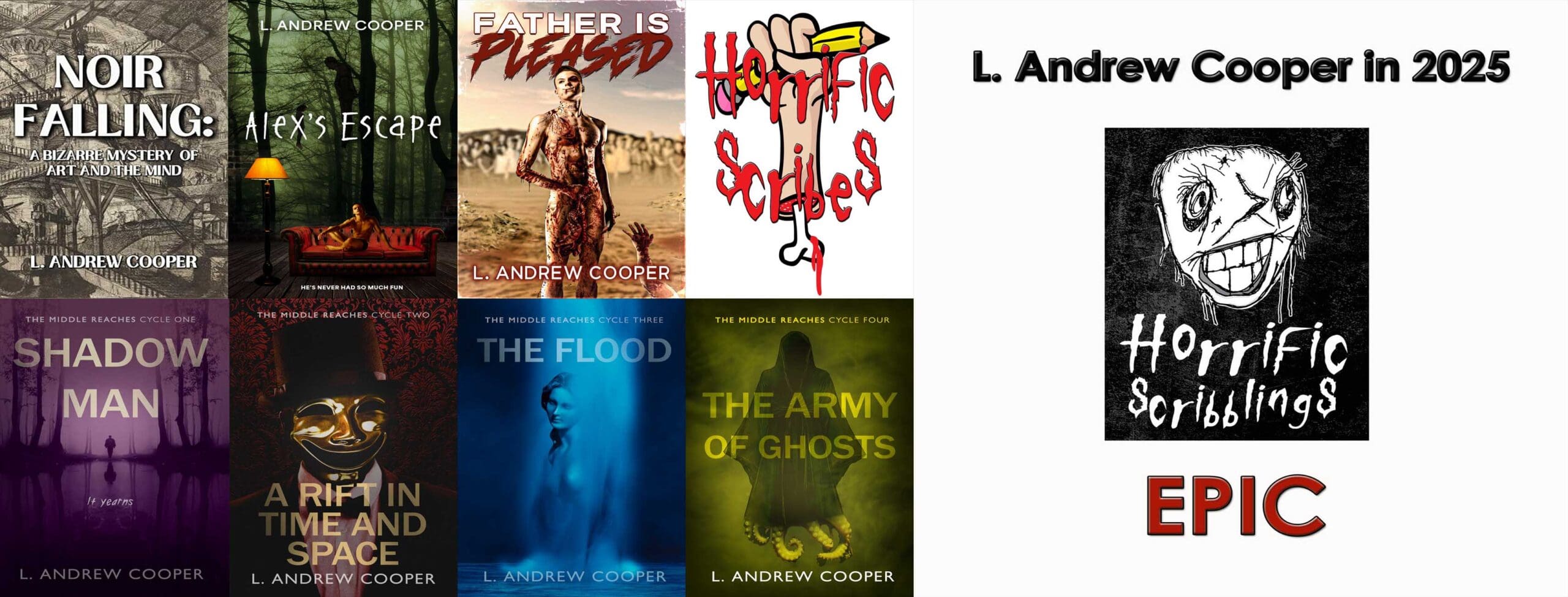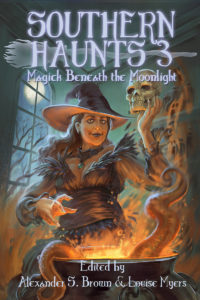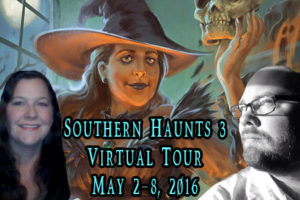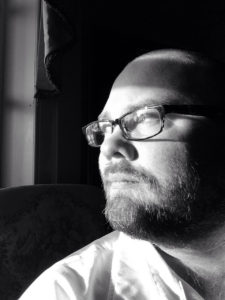Spotlight: Southern Haunts 3: Magick Beneath the Moonlight (2016)
Book Synopsis for Southern Haunts 3: Magick Beneath the Moonlight, edited by Alexander S. Brown and Louise Myers: Deep within the South, read about the magickal folk who haunt the woods, the cemeteries, and the cities. Within this grim anthology, eighteen authors will spellbind you with tales of hoodoo, voodoo, and witchcraft.
From this cauldron mix, readers will explore the many dangers lurking upon the Natchez Trace and in the Mississippi Delta. They will encounter a bewitched doll named Robert from the Florida Keys, and a cursed trunk that is better left closed. In the backstreets of New Orleans, they will become acquainted with scorned persons who will stop at nothing to exact their revenge.
These hair-raising tales and more await you in Southern Haunts 3: Magick Beneath the Moonlight. Read if you dare.
Interview with Alexander S. Brown, Editor
Witch South? While every story in Southern Haunts 3 has at least a character or setting connected to the Southeastern United States, the range of characters and settings is broad. For example, the central character in “Live Big” is a New Yorker who finds trouble in Key West, and “Without Xango There Is No Oxalla” haunts the U.S. by way of Brazil. Beyond character and setting, what, if anything, makes a haunting particularly Southern? What, if anything, makes a story Southern?
In reality, for the haunting to be Southern, the entity must be in the South. It is true that some spirits are travelers, meaning when they get tired of being in one place, they can attach themselves to the living and jump off at their preference. This type of attachment haunting rarely happens, as most spirits tend to dwell where they spent their life or final moments.
In a story telling sense, for the haunting to be Southern, if we were to take away setting and location, we are left with the narrator’s tongue. However, just because the narrator’s dialogue reflects Southern slang and phrases, that doesn’t make the tale Southern. Anyone from any culture can tell any story they like, but in the end, the story is its on placement in location.
For a story to be Southern, there must be Southern elements. For example: the tale must be seasoned with Southern verbiage, culture, habitat, architecture, food and drink. One could say, “I reckon Dixie is out back drinkin’ her mint julep after eatin’ that gumbo.” Without me saying the speaker or setting is Southern, the reader can identify that this story probably isn’t going to be set in Maine.
Storied Witching. The opening tale, “Granny Wise,” ends with a note about how readers can discover facts about the fictionalized Granny’s historical precedent, and the book’s “Outro” emphasizes that “tales were inspired by actual events, places, and persons throughout the South.” Within the tales, discovering and telling older tales—such as “The Untold Tale of Wiccademous”—also becomes a focus. Why do you think uncovering a magickal history is so important for the book as a whole as well as for particular stories?
When creating Southern Haunts the idea was to find true stories and bend them into fiction. The call that we had, stated, “Become inspired by an actual person, place or event and write a fictional story based on what would happen if your character interacted with that subject.” This was the premise that allowed Spirits that Walk Among Us to exist, as well as Devils in the Darkness, and Magick Beneath the Moonlight.
For this particular volume, magickal history is important to the South. The further South one goes, the richer the superstitions, fundamentals, and practice become. Any sort of history is important to remember, however, magickal history seems like it is swept under the rug more so than haunted history. Because of the masses knowing very little about iconic characters such as: Marie Laveau, Granny Wise, and the Yazoo City Witch, it is important to direct their attention to these magickal names in history, so more can be learned about them.
Bewitched Legacies. Titles such as “Vengeance” and “Cursed” make the emphasis clearest, but almost every story in the volume ties magickal events to justice or revenge. Why do you think this connection is so strong? Further, several stories place larger social injustices—particularly the legacies of slavery and lynching—behind supernatural events. With its specific histories of social injustices, is the South a cursed place? Why or why not?
Despite if a spell be casted for revenge or justice, I believe these subjects entertain the reader on a level they can relate to, but from a magickal perspective. Many persons have known what it’s like to be wronged without having an opportunity to receive payback. Because of this, I believe vigilante stories satisfy a depth of our crocodile membrane that we try to keep locked away. When reading stories such as these, it grants that dark side of us satisfaction in a healthy non-violent way. What makes these stories even more intriguing is that their weapon of choice is magick, and it provides unique scenarios that are abnormal compared to what Charles Bronson might do under the circumstance.
I don’t believe the entire South is a cursed place, however, I do believe there are cursed spots. But these spots aren’t just throughout the South, they are throughout our nation, and the world and I do believe historical actions play a big role in this. I believe this because it is simple to create a cursed object or location with one’s emotions. I also believe most persons create curses while being unaware they are doing so. For something to be cursed, ritual and prayer can play a factor, however, most cursed objects or places are born out of hatred, fear, and depression as they absorb the vibrations of the sufferer.
Good Witch, Bad Witch. The intro talks about “bad apple” witches as exceptions, and the outro mentions good and bad witches being a matter of individual judgment just like good and bad people. Your subtitle gives “magic” a friendlier, and more contemporary, “k” ending as well. “The Apartment House” and other stories demonstrate that the spiritual traditions associated with magic(k) have their own codes of good and bad. In 2016, what’s important about addressing questions of good and bad when you put together horror stories about magic(k)?
Depending on the question, depends on the answer. But to give a summary of magick and the occult in general is to remember that in every grouping, no matter what that grouping is, there will be practitioners, or persons, with good and bad hearts. Because of this, every occult practice comes with warnings, and in most cases, magickal workers are aware of the three fold, which can prevent anyone from wanting to dive into the darker side of magick.
Throughout my occult studies, I have noticed Satanism, (not to be confused with witchcraft, voodoo, Santeria, etc) even has their own set of commandments to abide by. These commandments allow them to live a fulfilling life, and suggests they respect all walks of life, as long as they are respected in return. Since most denominations of Satanic practice don’t believe in any sort of higher or lower power, their fundamentals allow some wiggle room for curses. Even with this being so, these practitioners are well aware of the repercussions of sending out harmful vibes.
Overall, the majority of the occult is a gray practice, meaning anything used for good can be used for bad. At a young age, we are taught how to pray, may this prayer be occult related or not. Once we are taught how to pray, this allows us to open up the door to ask for whatever we want to whoever we want. For those who are afraid of magick workers, I urge for you to do your research in non-fiction occult books. Once you understand the subject, your fear of all magick practitioners being evil will fade.
Witch Appetites. As I read it, your story, “Dances with Witches,” has a lot to do with appetites: a man with violent appetites follows a strange yearning that puts him in the way of appetites of another, more supernatural kind. Whether it’s based on desire for violence, power, sex, revenge, or something else, appetite seems like a source of horror in your story and throughout the book. What’s magickal—and horrible—about appetite?
We all have an appetite, and satisfying that appetite isn’t a bad thing. Such as our dietary intake, moderation is the key. Being a practitioner of Voodoo/Catholicism/Santeria I might pray to Saint Joseph to help me financially. For this to be possible, I give sacrifice (mostly fruits, sweets, or meat from the grocery). Upon asking for Saint Joseph’s assistance in my financial standing, I know to be humble in my request so that I am asking for nothing more than what I need. After asking for spiritual help, I have to also be willing to work for the money I need. It is the strength of Saint Joseph who fulfills me when I no longer feel that I have the gumption to continue. To have a humble appetite and working with spirits to satisfy that can be very rewarding and magickal.
The flip side of this is overindulgence. This is entering ritual with greedy expectations. I can’t think of too many positive entities who would answer prayers in regards to greed, as an overindulgence of anything can be hazardous mentally, physically, and spiritually. For magick practitioners who decide to turn to negative spirits to get what they want, the price can be more than what one has bargained for. Be careful what you wish for, is the best advice I can give to these practitioners. The most horrifying thing I could conceive by practicing negative magic in regards to overindulgence is the possibility of death or insanity.
Witch Direction? What’s next for the Southern Haunts series?
Southern Haunts is perhaps at the midway point of concluding. We are expecting to get Southern Haunts 4 together which will regard creatures of the South and Southwest, this one will probably be the only book that is strictly based on nothing more than Southern folklore. Southern Haunts 5 will be based on serial killers of the South and Southwest. If the fandom is still strong, we might do a Southern Haunts 6 which will be invite only where the best of the best have free choice to write about ghosts, demons, witches, creatures, or serial killers.
About the Editors:
Alexander S. Brown: Alexander S. Brown is a Mississippi author who was published in 2008 with his first book Traumatized. Reviews for this short story collection were so favorable that it has been released as a special edition by Pro Se Press. Brown is currently one of the co-editors/coordinators with the Southern Haunts Anthologies published by Seventh Star Press. His horror novel Syrenthia Falls is represented by Dark Oak Press.
He is also the author of multiple young adult steampunk stories found in the Dreams of Steam Anthologies, Capes and Clockwork Anthologies, and the anthology Clockwork Spells and Magical Bells. His more extreme works can be found in the anthologies Luna’s Children published by Dark Oak Press and State of Horror: Louisiana Vol 1 published by Charon Coin Press.
Visit Smashwords.com, Amazon.com, and Barnesandnoble.com to download his monthly short stories known as Single Shots. These are represented by Pro Se Press and they are known as stories that will be featured in the upcoming book The Night the Jack O’Lantern Went Out.
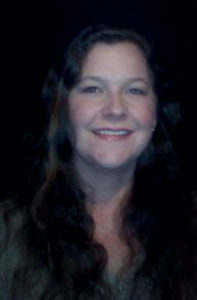
Louise Myers: Louise Myers was born in New Orleans and during her teenage years was uprooted from everything she knew and was replanted in Mississippi. Though the transition was difficult, she is very glad to have the opportunity to have both worlds under her belt. She says this because she knows from living in both places, they are both a world all to their own. She is the wife of a wonderful husband and mother of three beautiful children, as well as the proud parent of a spoiled mutt.
She was assistant editor of Southern Haunts: Spirits That Walk Among Us, co-editor of Southern Haunts 2: Devils in the Darkness, and co-editor of Southern Haunts 3: Magick Beneath the Moonlight.
She is a beta reader, book doctor, editor, and author. Though this is her second story in print, she has been weaving tales for many years for pleasure. She has many thoughts on several topics she’d like to write, mostly surrounding ghost stories.
Fantastic Flights, Historic Hurlyburly: L. Andrew Cooper’s Review of Southern Haunts 3
Southern Haunts 3: Magick Beneath the Moonlight is a short-fiction anthology that delivers a delectable range of witch-tastic events and images, successfully indulging fantasies of magical power and a fetish for the history of things weird. [For the rest of my review, keep reading, or for an interview with the book’s co-editor Alexander S. Brown, go here.]
Leaving the most familiar questions about whether so-and-so is or isn’t a witch in the background, and saving the typical witch-hunts for Yankee territory, the stories in Southern Haunts 3 presume the existence of magic and focus on the power’s whats and whens. From these whats and whens readers get a sense of a where, the American South, which is both horrific and mystical. As a result, this collection of stories stands apart from typical witch-horror while affirming, in the Southern Gothic tradition, that regular old “realistic” storytelling doesn’t quite get one of the U.S.’s most culturally diverse and historically troubled regions.
While I’m conflating all the mystic goings-on in Southern Haunts 3 as witchery, the collection’s editors and authors are careful to distinguish among types of magic and related spiritual traditions, naming the book’s primary whats distinctly as voodoo, hoodoo, and witchcraft. “The Apartment House,” for instance, provides a series of bizarre and violent tableaux—death by books is my favorite, but a detailed flaying deserves mention—and ties them together with a lesson on the laws for practicing voodoo the right way. In “La Voyante,” a knowing character explains to a writer looking for a new creative outlet that voodoo isn’t the only game in town:
“No, we talkin’ ’bout Hoodoo. Between the ‘hoo’ an’ the ‘voo,’ there’s a worl’ of difference… though we do tend t’ use a bit of both in these parts.”
Often gesturing toward the diasporic and creolized origins of so-called “pagan” spiritualities tied to hoodoo and voodoo, the stories in Southern Haunts 3 provide a nuanced enough view to add an S to the K in the subtitle, making it a less elegant MagickS Beneath the Moonlight (not a suggestion—the actual title is much better!). Indeed, as the main character of “In the Dark” learns, some magic needs to be practiced only in the day, so “moonlight” isn’t even a consistent feature of proper witchery. Magic refuses easy limits, and while it can be as elegant as the kindly title character of “Granny Wise,” it can also be as ugly as characters’ habits in “Dances with Witches.” The collection tells us that all these magics might fit in a book, and they all show up in the South, but they won’t all fit in a proverbial box. The box mentioned in the title “The Priestess’s Trunk,” then, provides an apt metaphor: you might try to contain and understand mystical forces, but magic will always find a way to push beyond easy categories and simple expectations.
Despite the diversity of magical types in Southern Haunts 3, magical power almost always serves one end: payback. While the book draws its power from many veins, it directs that power primarily toward fulfilling fantasies of justice and vengeance (for comments on this focus from one of the book’s editors, see the interview). The first tale, “Granny Wise,” based on a historical figure, sets the mold: a witch serves locals as a healer, but the price of her services includes righting wrongs. In most tales that follow, witchcraft, as a means for payback, either doles out a kind of cosmic justice against evildoers (as, for example, in “Live Big”) or serves as means for a witch to get some vengeance on (as in “Vengeance,” “The Jar,” “Tell Me Where He Lies,” and “Without Xango there is No Oxalla”). The most salient motive for mystical vengeance in Southern Haunts 3 relates to the South’s legacies of racism, slavery, and lynching. In “The Untold Tale of Wiccademous,” searching for the story behind cursed woods leads the would-be storyteller into a cosmic trap forged from these legacies. “Cursed,” set in the 1920s, takes a more direct look at magic providing justice for a lynching that earthly courts would ignore, and “The Shadows” answers a nineteenth-century slave-master’s murder of an innocent man with a curse that takes “life for a life.” While magical means of achieving racial justice help to advance the book’s Southern identity, magic also serves as an equalizer for women who suffer under the arbitrary rule of despicable men. The mystic in “Secrets of the Heart” learns that her husband’s religious hypocrisy too easily stands in the way of his devotion to her, a betrayal she does not suffer lightly; likewise, when a violent husband crosses “The Bone Picker Witch,” he opens the door for some of the book’s nastiest moments. In most cases, mystical vengeance is overwhelming and horrific, but the justification that goes with it makes rooting for magical victory a source of grim pleasure.
While the fantasy of supernatural justice is fun to indulge, it recurs a little too often within the selection of tales, and the stories that rely on it less end up being my favorites in the book. “The Witch of Honey, Kudzu, and Coyotes” shrouds its title figure in mystery, making her more like a force of nature than a person practicing a secret art. Going further with an interest in storytelling that runs through “The Untold Tale of Wiccademous” and several other tales in Southern Haunts 3, “The Witch of Honey, Kudzu, and Coyotes” opens with an interrupted story that persists in the narrator’s imagination “like a hollow, unformed thing” alongside
“a boy missing from everyone’s memory”
Broken stories and memory gaps make magic powerful enough to reshape thought and perception, reweaving reality’s fabric; as a result, this tale can explore fresh and compelling territory. Likewise, “In the Dark” focuses on the perils of exploring the unknown. A bit rambling in structure, this tale brings its unwise protagonist in contact with strange verse, talking birds, and a host of disturbing images—my favorite is a buck with centipedes pouring from its mouth—that again signal a link between magic and distorted perception that can change the rules for what a story can do. Fans of more transgressive and gruesome horror fiction will likely count “In the Dark” and “The Bone Picker Witch” as favorites along with “Docta Bones,” in which the title character inverts Granny Wise’s benevolence by requiring much harsher payment for the gods’ services, and “Dances with Witches,” which places a human appetite for evil in parallel with a bewitched landscape’s. Chilling acts and images become the main products of witchery: questions of justice and the natural order become secondary to experiencing the full horror of the weird.
A volume about magic and the South invites thinking about cultural and regional history, and with stories set in (or focused on rediscovering) the eighteenth, nineteenth, and early twentieth centuries, Southern Haunts 3 does a great job of putting together views of the past (and thus it meets its goals–see the interview). As a Southerner, I wonder about the present. Where is witchcraft in the contemporary South? How do hoodoo and voodoo continue to inform life not just in old New Orleans, but also present-day Atlanta, Richmond, and cities in between with “modern” feels that contrast with the antiquarian interests that dominate this book? The book covers solid ground, but by sticking mainly to historical subjects, it might miss some opportunities for innovation.
The opportunities included, however, add up to a satisfying read. Moody, atmospheric, and drenched in regional detail, Southern Haunts 3 gives readers an entryway to the South’s mystic history, places and times to explore with equal amounts of dread and delight.
Southern Haunts 3: Magick Beneath the Moonlight,
Table of Contents
- “Granny Wise,” by H. David Blalock
- “Live Big,” by Tom Lucas
- “The Priestess’s Trunk,” by C.G. Bush
- “The Witch of Honey, Kudzu, and Coyotes,” by Diane Ward
- “The Untold Tale of Wiccademous,” by J.L. Mulvihill
- “Vengeance,” by Linda DeLeon
- “The Jar,” by Robert McGough
- “La Voyante,” by Elizabeth Allen
- “Cursed,” by Melodie Romeo
- “Secrets of the Heart,” by Louise Myers
- “Tell Me Where He Lies,” by Greg McWhorter
- “Shadows,” by Kalila Smith
- “Docta Bones,” by Melissa Robinson
- “In the Dark,” by Jonnie Sorrow
- “The Apartment House,” by Della West
- “Without Xango There is No Oxalla,” by John E. Hesselberg
- “The Bone Picker Witch,” by Angela Lucius
- “Dances with Witches,” by Alexander S. Brown
